It is always better to prepare than to miss opportunities, particularly when it involves closing sales deals. You cannot let your lack of readiness risk potential success. This is where sales mock calls come into the picture.
Mock calls not only help refine your sales pitch but also simulate real-world scenarios to build confidence. This is surely helpful as 92% of all customer interactions happen on the phone.
In this end-to-end guide, we will explore the benefits of mock calls and provide practical examples of successful sales scripts.
Let’s get started without further ado.
During mock calls, focus on developing active listening skills. Pay attention to the prospect's tone, concerns, and questions.
This not only helps you understand their needs better but also allows you to tailor your responses effectively, building rapport and increasing the chances of a successful interaction.
What is a Mock Call?
A mock call is a simulated phone conversation used for training purposes, especially in sales and customer service roles. These practice calls help individuals to refine their communication skills, learn how to handle different scenarios and receive constructive feedback.
By participating in mock calls, trainees can build confidence, improve their ability to respond to customer needs, and improve their overall performance. To sum up, a mock call is a valuable practice for preparing individuals to do their best in their actual job roles.
What are the Benefits of a Mock Call?
As learned in the previous section, mock calls, also known as practice calls or mock sales calls, involve scenarios based on actual sales script examples. Here are 5 major benefits of mock calls for sales teams:
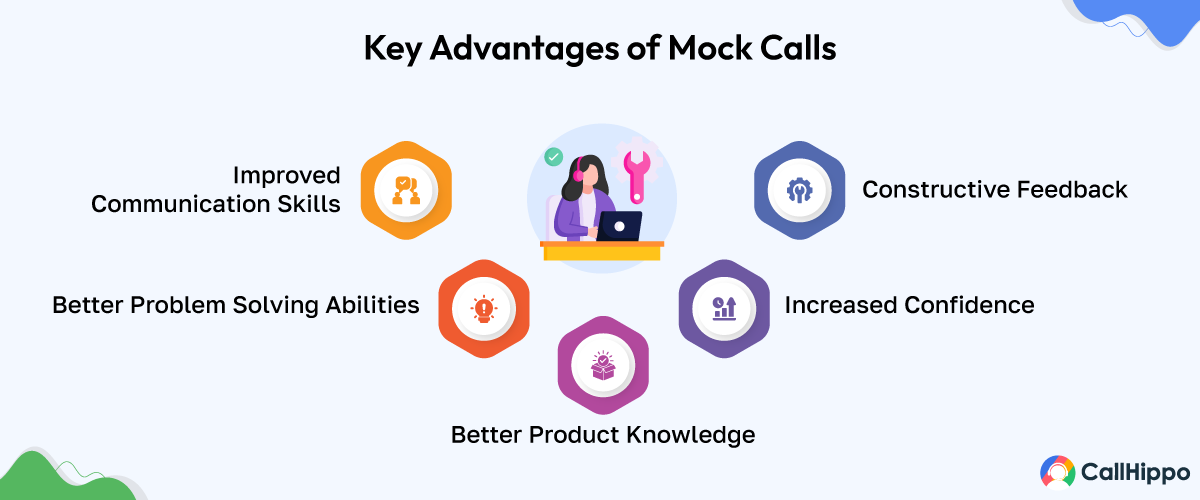
1. Improved Communication Skills
The first major benefit of mock calls is that it provides a safe environment for sales reps to practice and improve their communication skills. By engaging in mock call practice, reps can work on articulating their thoughts clearly, using appropriate language, and maintaining a professional tone. This helps them become more confident and effective in real customer interactions– leading to higher lead conversion rates.
2. Better Problem-Solving Abilities
During mock calls, sales reps encounter various scenarios that require quick thinking and problem-solving. These practice sessions expose reps to common objections and challenges they might face during actual sales calls. By handling these situations in a controlled setting, reps can develop strategies to overcome objections and provide effective solutions. This will ultimately improve their performance in real sales situations.
3. Better Product Knowledge
Mock calls often involve discussions about products or services, giving sales reps the opportunity to deepen their understanding of what they are selling. Through mock call training, reps can learn to highlight key features and benefits, address common customer questions, and tailor their pitch to meet customer needs. This thorough product knowledge ensures that reps can accurately represent their offerings during real sales calls.
4. Increased Confidence
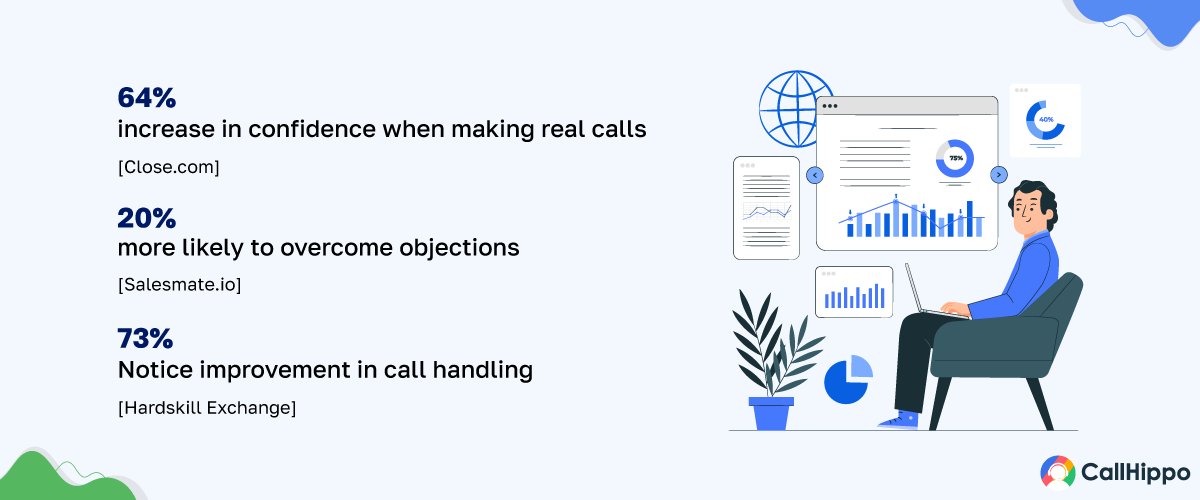
Regular participation in mock calls helps sales reps build confidence in their abilities. By repeatedly practicing different scenarios, reps become more comfortable with the sales process and their skills. This increased confidence translates to real sales calls– where reps are more likely to engage customers effectively and close deals successfully.
5. Constructive Feedback and Improvement
One of the most valuable aspects of mock calls is the feedback provided by managers or peers. After each practice call, reps receive constructive criticism and suggestions for improvement. This feedback helps identify areas for development, such as refining sales scripts, improving listening skills, or adjusting the approach to certain customer objections.
To sum up, by incorporating mock call practice into their training programs, sales managers can ensure their teams are well-prepared, confident, and capable of handling any sales scenario.
7 Strategies for Better Mock Calls (For Sales Managers and Reps)
Mock calls provide you with a safe environment where sales reps can practice their pitches and refine their techniques without the pressure of an actual sales call. Here are 7 strategies to help you get the most out of your mock calls:
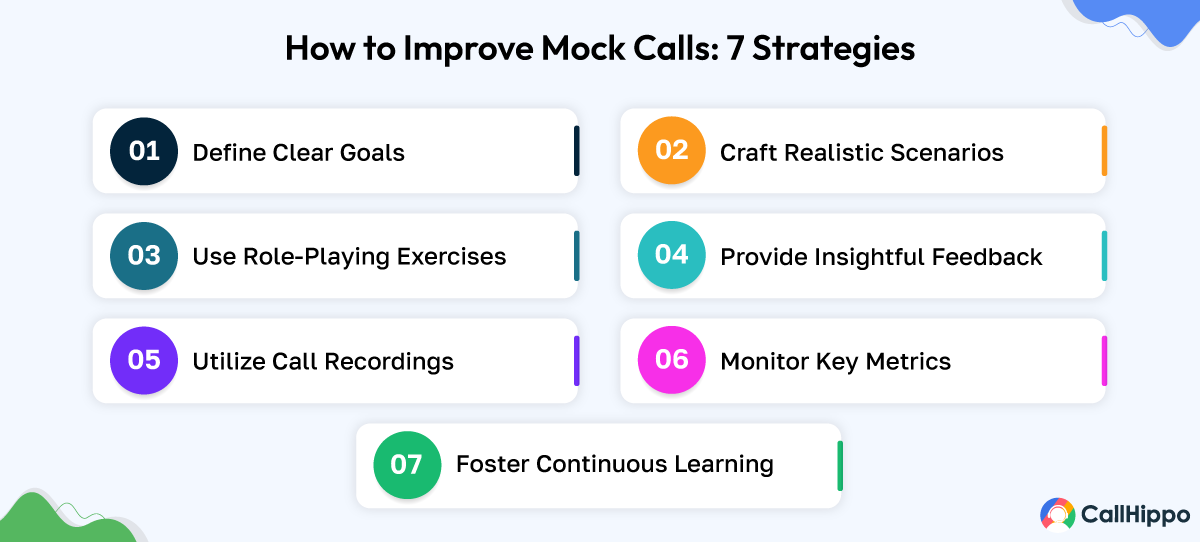
1. Defining Goals for Effective Mock Calls
Before you start, define the purpose of your mock call. Are you focusing on improving your pitch, handling objections, or closing the sale? By setting clear objectives, you can tailor the mock call to address specific areas that need improvement. This focused approach ensures that each mock call practice session yields tangible results.
2. Crafting Realistic Scenarios for Practical Learning
To make mock calls effective, the scenarios should closely mimic real-life situations. Use actual customer profiles, common objections, and typical sales challenges your reps encounter. The more realistic the scenario, the better prepared your reps will be for real calls. This practice builds their confidence, making sales reps more effective in actual sales interactions.
3. Improving Skills through Role-Playing Exercises
Incorporate role-playing into your mock calls. Have one person act as the customer while another acts as the sales rep. This interactive approach makes the practice more engaging and helps reps develop their listening and responding skills. It also encourages empathy, as reps get a better understanding of the customer’s perspective.
4. Giving Insightful Feedback for Growth
After each mock call, provide detailed feedback. Highlight what was done well and areas that need improvement. Be specific in your feedback, and offer practical suggestions for improvement. Constructive criticism helps reps refine their skills and avoid repeating the same mistakes. This ongoing feedback loop is crucial for continuous development.
5. Utilizing Recordings to Improve Performance
Recording mock calls allows reps to listen to their performance and identify areas for improvement. It also provides a reference point for future training sessions. Reviewing recorded calls can reveal patterns in behavior, strengths, and weaknesses, making it easier to track progress over time. This reflective practice enables reps to self-correct and continually refine their approach.
6. Monitoring Key Metrics for Performance Analysis
Track key performance metrics during your mock calls, such as response time, objection handling, and closing rate. These metrics provide valuable insights into the effectiveness of your sales techniques. By monitoring these metrics, you can identify trends and make data-driven decisions to improve your training program.
7. Developing a Culture of Continuous Learning
Mock calls should be an ongoing part of your training program. Encourage reps to participate regularly and strive for continuous improvement. Celebrate small wins and progress, and create a supportive environment where reps feel comfortable experimenting with new techniques. This culture of continuous improvement develops a growth mindset.
By following all these mock call strategies outlined here, including setting clear objectives, creating realistic scenarios, and using role-playing, you can maximize the effectiveness of your mock call practice.
How to Conduct a Mock Call: Step-by-Step Guide
Mock calls are an essential part of sales training, providing a safe environment for sales reps to practice and refine their skills. But how do you effectively conduct a mock call? Here are 5 steps to make sure your mock call practice is both productive and engaging.
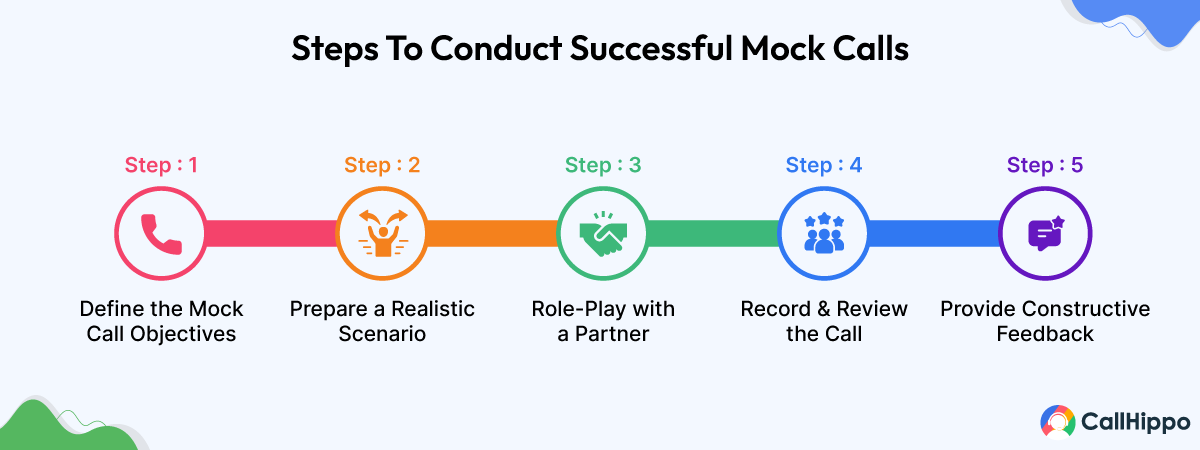
Step 1: Define the Mock Call Objectives
Before starting, it’s crucial to understand the mock call meaning and set clear objectives. Are you focusing on objection handling, product knowledge, or closing techniques?
Knowing your goals helps tailor the mock call to address specific areas of improvement. This clarity ensures that both the sales manager and the sales rep are on the same page– making the practice more effective.
Step 2: Prepare a Realistic Scenario
Creating a realistic scenario is key to effective mock calls practice. Use a mock call sales script that mimics actual sales situations. This could include common objections, customer questions, and typical challenges faced during a real call.
The more realistic the scenario, the better prepared the sales rep will be for actual sales calls. To ensure your scripts are on point, review mock call samples and mock call examples.
Step 3: Role-Play with a Partner
Role-playing is a fundamental part of conducting a mock call. Have a colleague or manager act as the customer while the sales rep takes the call. This dynamic helps simulate real-life interactions, making the practice session more beneficial.
During the role-play, encourage the use of the mock call sales script and provide immediate feedback on performance. This step is important for developing good habits and correcting mistakes on the spot.
Step 4: Record and Review the Call
Recording the mock call allows for a detailed review session. After the call, listen to the recording with the sales rep and discuss what went well and what could be improved. Pay attention to tone, pace, and the handling of objections.
This reflective practice helps identify strengths and areas for improvement, making future mock calls more effective.
Step 5: Provide Constructive Feedback
Providing constructive feedback is crucial for growth. Focus on specific aspects of the call, such as how well the sales rep followed the mock call sales script, handled objections, and engaged the customer. Highlight positive aspects first, then discuss areas for improvement. Be specific and offer actionable advice to help the sales rep improve in future calls.
Advanced Call Tracking
- Advanced Call Analytics
- AI Sentiment Analysis
- Omnichannel Support
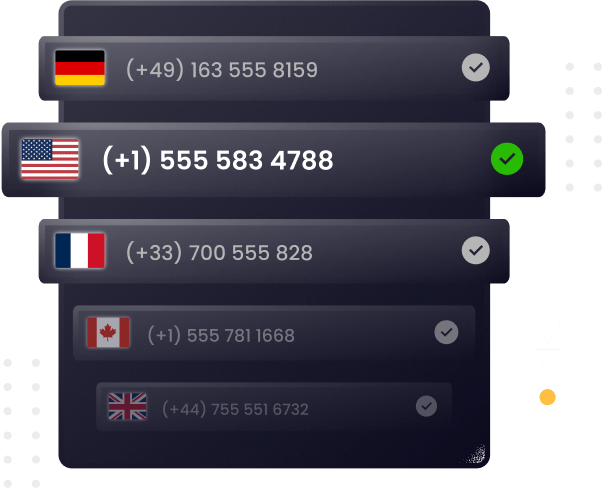
By following these five steps, you can conduct mock calls that are both productive and engaging. This practice not only helps sales reps understand what is a mock call but also prepares them to do their best in real sales scenarios.
8 Best Mock Call Sales Script Examples
So now we have learned what a mock call is, the benefits of mock calls, and strategies to create them. Now comes the real part: mock call examples. Let’s look at 8 of the best mock call sales script examples to help you understand how you can use these scripts to improve your sales training.
1. Introduction and Rapport Building
Scenario: The sales rep is calling a potential customer who has shown interest in the company’s product through a website inquiry.
Script:
Rep: Hi [Customer’s Name], this is [Rep’s Name] from [Company]. How are you today?
Customer: I am good, thanks. How about you?”
Rep: I am doing well, thank you for asking. I noticed you recently visited our website and showed interest in our [product/service]. I’d love to learn more about your needs and see how we can help. Do you have a few minutes to chat?
2. Identifying Needs
Scenario: The sales rep is identifying the customer’s pain points and needs to tailor the pitch accordingly.
Script:
Rep: Can you tell me a bit more about your current situation and what challenges you’re facing with [specific problem]?
Customer: We are struggling with [specific challenge].
Rep: I understand. Many of our clients have faced similar issues. How are these challenges impacting your business?
3. Presenting the Solution
Scenario: The sales rep explains how their product or service can solve the customer’s problem.
Script:
Rep: Based on what you have shared, it sounds like our [product/service] could really help. It offers [key features] that can address [specific challenge]. For example, [provide a short success story or statistic]. How does that sound to you?
4. Handling Objections
Scenario: The customer raises concerns about the product or service.
Script:
Customer: I am not sure if this fits within our budget.
Rep: I understand budget is always a concern. However, our [product/service] can save you money in the long run by [specific benefit]. Additionally, we offer flexible payment options that might work for you. Can I provide more details on that?
5. Building Urgency
Scenario: The sales rep creates a sense of urgency to encourage the customer to take action.
Script:
Rep: I wanted to let you know that we currently have a promotion running for the next week, offering a 20% discount on our [product/service]. This could be a great opportunity to address [specific challenge] at a lower cost. Would you be interested in taking advantage of this offer?
6. Closing the Deal
Scenario: The sales rep is ready to close the deal and guide the customer through the next steps.
Script:
Rep: It sounds like our [product/service] is a great fit for your needs. Shall we go ahead and get you started? I can walk you through the process and answer any final questions you might have.
7. Follow-Up Call
Scenario: The sales rep follows up with a customer who previously expressed interest but didn’t commit.
Script:
Rep: Hi [Customer’s Name], it’s [Rep’s Name] from [Company]. We spoke last week about [product/service], and I wanted to follow up to see if you had any additional questions or if you’ve had a chance to think more about our conversation.
8. Re-engaging a Past Customer
Scenario: The sales rep is reaching out to a past customer to re-engage and discuss new offerings.
Script:
Rep: Hi [Customer’s Name], this is [Rep’s Name] from [Company]. I hope you’re well. I wanted to check in and share some exciting new updates about our [product/service]. We’ve recently added [new feature], which I think you’ll find valuable. Would you be interested in learning more?
These 8 mock call sales script examples are designed to empower your sales team with structured approaches to handle various stages of the sales process effectively.
By practicing these scripts in mock call sessions, sales professionals can refine their communication skills, overcome objections, and ultimately improve their conversion rates.
Common Mistakes During Mock Calls
Mock calls are a great way to improve communication skills, but they only work when they’re properly done. Many sales reps make simple mistakes that ultimately impact their performance in real calls. It’s important to identify these issues as it builds confidence and improves interactions.
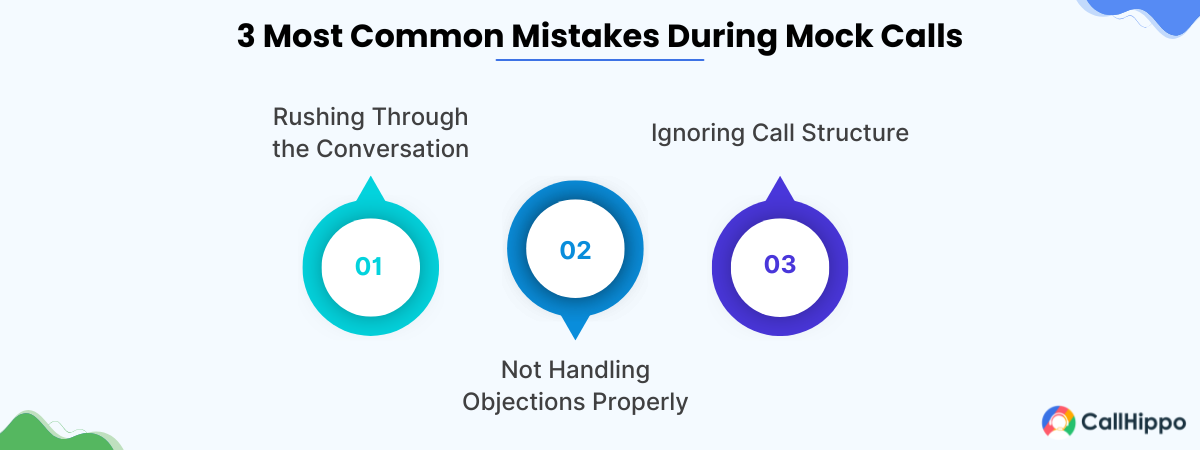
Below are three common mistakes and how to fix them.
1. Rushing Through the Conversation
A lot of times, reps feel pressured to finish quickly, which causes responses to remain incomplete and the tone to become robotic. Rather than just focusing on speed, they should prioritize clarity and engagement.
When a steady pace is maintained, and you actively listen to the prospect, the call is more effective. Utilizing call center phone systems features, like call recording and AI-generated insights, can assist reps in evaluating their performance.
2. Not Handling Objections Properly
A lot of reps either go defensive or avoid objections entirely. They seem ill-prepared as a result. The right approach is to acknowledge concerns, ask clarification questions, and provide relevant solutions.
A response that is well-structured tends to build trust and keeps the conversation moving. As reps practice with real scenarios, they can handle objections more confidently.
3. Ignoring Call Structure
One of the issues faced is that the call lacks direction when it does not have a clear introduction, needs assessment, and a closing statement. While maintaining a professional and smooth conversation, adhering to a standardized framework guarantees that all important topics are covered. Mock calls for customer service should use the best practices and technologies to replicate real-world interactions.
Conclusion
Mock calls are invaluable for honing sales skills through practice scenarios that mimic real interactions. They offer benefits like boosting confidence, refining pitch delivery, and learning objection handling. By utilizing mock call strategies and scripts provided in this blog, teams can improve their performance, overcome objections, and ultimately increase their success in closing deals.
FAQs
1. Which tools and resources are required for mock calls?
Mock calls require basic tools like a phone or computer with internet access, a quiet environment, and possibly recording equipment for feedback.
2. How often should I practice mock calls?
It’s beneficial to practice mock calls regularly, ideally weekly or bi-weekly. Consistent practice helps refine skills, build confidence, and adapt to different scenarios.
3. What are some common mistakes to avoid in mock calls?
Avoid common mistakes such as over-reliance on scripts and failing to actively listen to prospects. Focus on natural conversation flow, empathy, and adapting responses to the prospect’s needs for better outcomes.

Subscribe to our newsletter & never miss our latest news and promotions.









